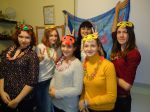|
Right
place of adjectives and adverbs
Task:Remember
all the examples (15)
(time
-
day
-
date
-
year)
He
was born at 22:15 on
Monday, March 17th, 1958.
Adverbs
of frequency(often...)go
after the auxiliary verb(be,
have, do),
but
before the
main verb.
She has
never travelled abroad.
She
is often late.
Adverbs
of degree (absolutely, completely, just, totally, extremely, quite,
seriously, very, etc.) go
before the adjective or the adverb they describe.
He's
absolutely hopeless at Maths.
We quite
enjoyed the film.
I've quite
finished.
Absolutely,
completely and totally can go in the middle or end position.
He completely forgot our appointment.
I'm
terribly sorry.
My tooth
hurts terribly.
Any
position:
Luckily,
he didn't crash into the tree.

Students
He luckily
didn't crash into the tree.
He didn't
crash into the tree, luckily.
We
use adverbs
after action verbs and
adjectives
after linking verbs:
appear,
be, become, get, feel, look, seem, smell, stay, taste.
It tastes
bad. (NOT: badly).
She looked
happy at the party.
She looked
happily at the children.
|

